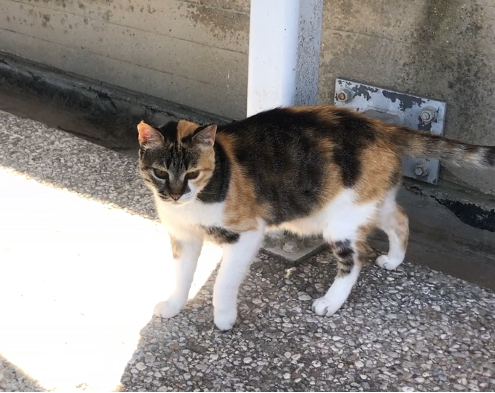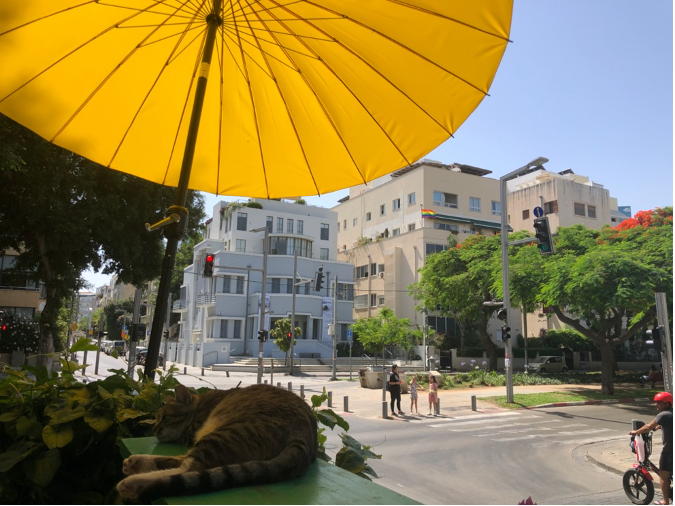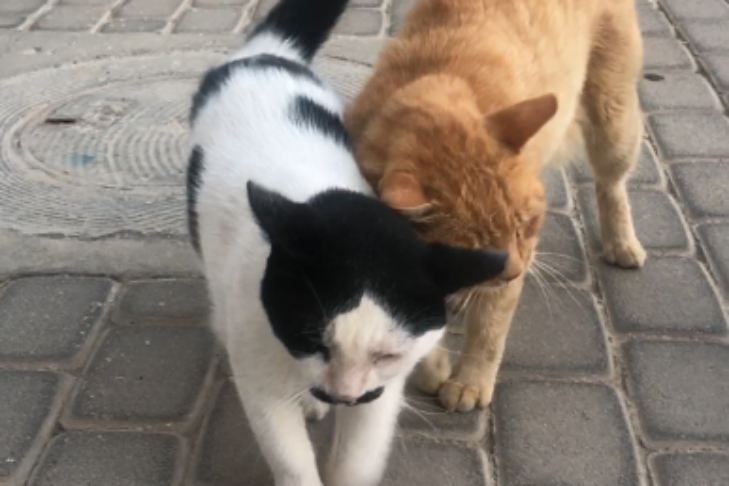After a summer living in Haifa and traveling around the country, I can definitively say that one of my favorite things about Israel is the street cats. I’m greeted by their little bodies at every turn: fat, long, orange, white, black, spotted. Some are easily scared; they startle when I get near and disappear under a car. Others, like the ones that hang around the apartment building the Boston Haifa cohort stayed in, or like the few that call the University of Haifa home, love interacting with humans. They plod up to me and weave between my shoes, meowing, eager for attention. When I told my Israeli friend from MIT how much I loved the street cats, she laughed and quipped, “Oh, the squirrels?” But I believe they uniquely captured the day-to-day moments of my life in Israel, plus they’re cute, and so this is an ode to my favorite cats of the summer.
Above are two cats in love, whom I’ve nicknamed Romeo and Juliet, that I saw while staying in a kibbutz in the Negev during our Israel Now days. An important part of the Onward experience is the educational programming; this includes optional Shishi tours to popular destinations like Masada and the Dead Sea, as well as mandatory programming like the Shabbaton with more Onward students and the Israel Now days. Throughout these programs, our group had the opportunity to climb through the Bar Kokhba caves, taste wine at a winery at Gush Etzion, hike the Path of the Patriarchs, stargaze with professional telescopes and astronomers in the desert, make soap with a Bedouin businesswoman, and build traditional mud huts and eat bread and coffee with Ethiopian Jews. The weekend we stayed at the kibbutz where I saw Romeo and Juliet, we went to Jerusalem and watched several short films at an independent film school before touring the Old City.

Next is Moncel, the big spotted cat that hung around in the sun patches right outside my lab at the University of Haifa. The lab I worked in is called the Marine Geoarchaeology and Micropaleontology Lab, and they specialize in reconstructing coastal change, exploring questions about the way nature and human societies impact coastlines. The lab head, Dr. Beverly Goodman, is especially cool; she is a National Geographic explorer and an expert scientific diver and had lots of insight into the world of research and academia. The project I was working on centered around a sediment core from offshore Caesarea, an ancient Roman harbor dating to around 2,000 years old. I spent many of my days in the lab picking foraminifera, tiny single-celled marine microorganisms, from this core. Foraminifera are especially useful for paleo-environment reconstruction because they build their shells out of calcium carbonate, a mineral that can store lots of interesting information about the pH, salinity, temperature, and even depth of the ancient ocean. When I wanted to take a break from peering into the microscope at these small creatures, I would stand up, stretch, and take a walk to pet Moncel.

Finally, a big part of my experience this summer in Israel was having the opportunity to travel throughout the country every weekend. As a high schooler, I participated in an international program called the Diller Teen Fellowship that introduced me to many Israelis whom I became close friends with. I hadn’t seen most of them for nearly three years, and so many of my weekends this summer were spent reconnecting with and staying with them. I was so grateful to have home-cooked Shabbat dinners and warm beds to stay in wherever I went, and loved exploring different cities with the locals. I also have Israeli friends from MIT, and during the first weekend, I went to visit my closest friend right outside of Tel Aviv. Surprisingly, the journey on the bus there is one of my favorite memories from this summer. While I’ve traveled in Israel before, it was always either in a group or with family, and that first sensation of navigating Israel on my own felt truly significant. That weekend was incredible: I ran into the singing icon Netta Barzilai, went to the beach, made new friends, and of course saw some pretty cute cats.
Ultimately, while I do love the street cats for their adorable faces, their presence means more to me than just cuteness. They’ve marked each place and stage of my journey this summer, and they also somehow perfectly depict the sides of Israel that I love the most: welcoming, loud, and adventurous. I can’t imagine Israel without them.
Aviva Intveld, MIT ’23, is an earth atmospheric and planetary sciences major interning at the Marine Geoarchaeology and Micropaleontology Lab at the University of Haifa through the Boston Onward Israel program. 125 students from Massachusetts colleges have professional internships in their fields of interest in Tel Aviv, Jerusalem and Haifa this summer.
This post has been contributed by a third party. The opinions, facts and any media content are presented solely by the author, and JewishBoston assumes no responsibility for them. Want to add your voice to the conversation? Publish your own post here. MORE


